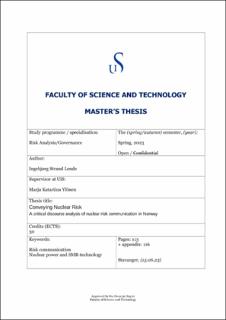| dc.description.abstract | Nuclear energy is not a new topic of debate in Norway, as it has been a subject of political discourse for many years. Political parties, such as the Labor party have previously (1957) fronted nuclear power as part of a new industrial revolution, powered by modern science and technique. Norway is also a contributor of some of the world-leading research within nuclear sciences. However, nuclear accidents like Three Mile Island (1978), Chernobyl (1986), and Fukushima-Daiichi (2011) as well as protests from social and environmental movements have cooled down the further discussions of commercializing nuclear power in Norway. The debate stood still until recent developments following the energy-crisis, concerns about reliance on fossil fuels, and the founding of a company pursuing to establish commercial nuclear power in Norway. The debate about nuclear power is yet again on the agenda.
Previous research points to a lack of research on long-term issues such as political discourses about national energy and climate policies, or changes in the multifaceted public debate over time. This thesis does not focus specifically on political discourse but try to say something about how the nuclear industry is communicating risks of nuclear power and SMRs in Norway. It investigates the long lines by discussing previous debates and historic incidents as well as the current situation and updated perspectives of the modern technology. This is done by interviewing stakeholders of the industry, such as scientists, commercial actors, and regulators. By analyzing the different emerging discourses, the thesis finds many different interpretations and communications of the nuclear risks. The most significant findings are regarding ambiguities over management of radioactive waste. The commercial actors and the regulators legitimize safety of handling the waste in completely different ways. As all stakeholders base their risk evaluations on strong arguments and a scientific basis, it is difficult to determine any ‘right’ or ‘wrong’ answer. It is therefore recommended that further research or internal discussions are made to gain a more consistent risk communication in the industry. Even though the thesis found a great deal of competence and well thought out risk communication, there are indications of little awareness in some of the actions performed. The stakeholders are hesitant to characterize their actions as ‘strategic risk communication’, and the good performances could thereby be a result lacking a risk-knowledge basis in some areas. However, the discourses also signalize a growing focus and awareness of the importance of effective risk communication in the nuclear industry. | |
